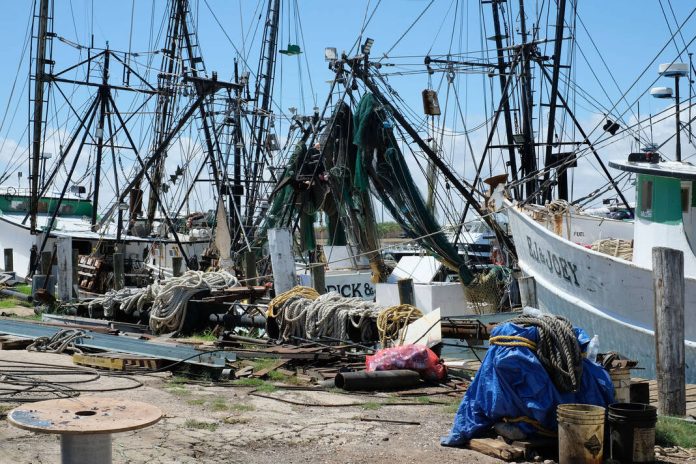
|
Only have a minute? Listen instead
Getting your Trinity Audio player ready...
|
The Gulf shrimp industry is struggling to stay afloat against a flood of cheap imported shrimp, and Brownsville-Port Isabel’s shrimp industry is far from immune.
It’s not a new problem, but this year the Port Isabel Economic Development Corporation opted to take action, in the form of financial assistance to help shrimp boat owners pay for fuel.
Port Isabel City Manager Jared Hockema said the EDC provided six grants of $10,000 each to individual boat owners on a first come, first serve basis. To be eligible, boat owners had to be based in Port Isabel and had to have operated a boat or fleet last year, he said. The city, meanwhile, made sure there was no overlap in ownership among recipient companies, so no one got more than their share, Hockema said.
He said the city is in close communication with its shrimpers, some of whom requested help in advance of this year’s shrimp season, which opened July 15.
“One of the things that came up is that some of the fleets needed a little bit of a jump start to get the season going this year,” Hockema said. “It was capped at $60,000. … Right now with the price of fuel it’s about $12,000 or $13000 to fill a shrimp boat for 30 days. A lot of these operations have more than one shrimp boat.”
The industry is central to the heritage of Port Isabel — dubbed the shrimping capital of the world in the mid-1950s — and the city wants to ensure that industry remains viable, not merely because of the historical and cultural importance but also the economic impact, he said. Each boat has a significant multiplier effect in terms of jobs supported, not only boat crews but also the fuel sellers, equipment suppliers, boat maintenance facilities, provision suppliers, restaurants and so on, Hockema noted.
He said the goal of the grants is to “keep a vital industry alive that’s really intertwined with our identity” while also giving visitors to Port Isabel what they expect: Gulf shrimp.
“If you don’t have the shrimp boats out there then you don’t have shrimp to sell in your restaurants,” Hockema said.
He said the industry has faced multiple challenges for years, including high fuel prices and manpower shortages, especially when it comes to experienced “headers,” the crew members responsible for getting the boat ready for fishing, lowering and retrieving the nets, and sorting and heading the catch.
“A lot of them do come from Mexico, but the problem is of course for them to obtain a visa,” Hockema said. “Those visas are usually given out at the beginning of the year, in January, and by the time the shrimpers … start in the summer those visas are already gone.”
Still, the ever-present glut of farm-raised, foreign shrimp is the main factor making it harder and harder to make a living pulling shrimp from the Gulf, he said.
This is the first time Port Isabel’s EDC has offered direct cash assistance to local shrimpers, though two decades ago some received relief in the form of Trade Adjustment Assistance from the International Trade Commission, stemming from a case brought before the International Trade Commission over illegally subsidized shrimp being dumped in the U.S. market.
Port Isabel’s shrimpers were among those in the domestic shrimp industry receiving $10,000 each in TAA payments.
“There were tariffs that were levied against those (foreign) shrimp producers, and then the money were used then to provide Trade Adjustment Assistance, which basically aids the impacted U.S. industries,” Hockema said. “They did receive that funding about 20 years ago. To be candid, that problem is still going on. We still have shrimp that is being subsidized illegally and dumped in the United States. We still have shrimp that is contaminated with antibiotics that’s being shipped in from overseas and being dumped in the United States.”
In the European Union, such cargoes, when intercepted by authorities, are destroyed on site, he noted, adding that if the United States had a similar policy, Port Isabel’s shrimp fleet might not be in such dire straits.
“You’re allowing shrimp to be imported below the cost of production, and so that’s just destroying the viability of an American industry, and that’s true with a lot of industries,” he said. “If it were steel or cars, the U.S. government would be taking action against them. They would be levying tariffs. They would be imposing other sanctions on that foreign industry. But in this case that action is not taking place.”



